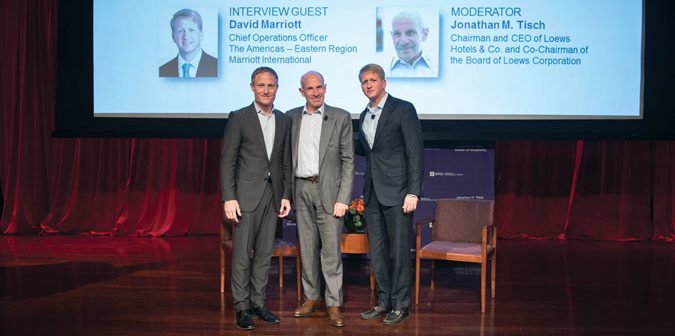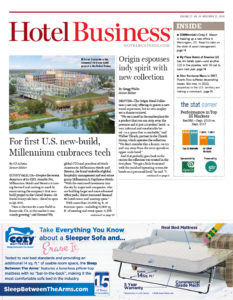NEW YORK—Last month, NYU’s Jonathan M. Tisch Center of Hospitality held the 24th annual Stephen W. Brener Distinguished Lecturer Series in Hospitality Management. Along with moderator Jonathan M. Tisch, chairman/CEO of Loews Hotels & Co. and co-chairman of the board of Loews Corp., this year’s speaker was David Marriott, COO, the Americas – Eastern region, for Marriott International Inc. Responsible for more than 2,000 hotels across 23 states since Marriott acquired Starwood Hotels & Resorts Worldwide, Marriott was able to speak to the night’s theme—leading in a transforming environment—while grounding the subject matter within the context of the industry’s past—namely, the company culture his grandparents, J. Willard Marriott and Alice Sheets Marriott, and father, J.W. “Bill” Marriott Jr., created.
“When my grandparents founded the business, they founded it on the belief that if you take good care of your associates, they’ll take good care of the customer, and the customer will come back,” Marriott said. “This is a people business. Your people are your most valuable resource, and they’re at the core of everything you do. If you invest in your people and take care of their needs, that is the key to success.”
Recognizing that the business is more complex today than it was 50 years ago, Marriott said that the company’s philosophy has nevertheless remained the same. “The formula for success hasn’t changed. It’s about inspiring and motivating your people,” he said.
“My grandfather, early on, was late to meetings, especially at his hotels, because he would be sitting one-on-one with the housekeepers, asking questions: How is your day going? What’s going well? What needs to be improved upon? Are they feeding you well?” he said. “Being able to show that you care through your deeds goes a long way.”
It’s a philosophy that Marriott’s father carried on. “Even at 86, he goes right to the kitchen, to housekeeping, thanking them for their efforts. I do the same,” he said. “There’s nothing more important than spending time with the associates. As we’ve acquired businesses over the years, that concept is sometimes foreign to them. We’ve been criticized by some of those executives, but at the core, it’s what it’s all about.”
Marriott noted that it’s this people-first culture that has enabled the company to succeed during the daunting undertaking of the Marriott/Starwood integration. “When you buy and acquire a large organization that you’ve been competing so fiercely with, the first thing you have to do is have a successful integration from a cultural standpoint,” he said. “Oftentimes, mergers fail because the cultural integration doesn’t go well. We really looked at integration through our three major stakeholders: our associates, our customers and our owners. We put that lens in place. We were very thoughtful.”
Marriott acknowledged that any merger of this scale would result in some people not ending up with a place at the table, so it’s important to have a people-first culture to make sure “we help them land on their feet somewhere else… That cultural integration was our top priority.”
Next, he said, was the systems integration. “We have several waves we’re working through over the next few months to make sure we can integrate the loyalty programs on the same technology platform,” he said. “Just to move SPG hotels onto our reservation platform requires them to change 17 different systems. It doesn’t occur without tremendous work; I couldn’t be more proud of our organization. When you take on something like this, which is groundbreaking in our industry and puts us in a place from a competitive standpoint that no one can really match, it’s very energizing. People are able to do more and find capacity they didn’t know they had.”
Marriott also noted that the company’s culture has helped it weather other transformational changes as well—such as a workforce that’s interested in a better work/life balance.
“One example of that: Over the last several years, our event management staff had been particularly under a lot of stress,” he said, noting that many would go 10-12 days without a day off. “We ran a pilot in the Carolinas—an alternative work arrangement. We provided them with the flexibility to work from home when they didn’t have a group in-house to give them the opportunity to get out of the hotel and have more balance. It was a huge homerun and we rolled it out across the region.
“It’s making sure that you have that connection with your workforce,” Marriott continued. “You’re aware of the issues they’re faced with. You follow through on commitments of how to support their life choices and provide not only a paycheck, but ensure they’re able to find balance.” HB


